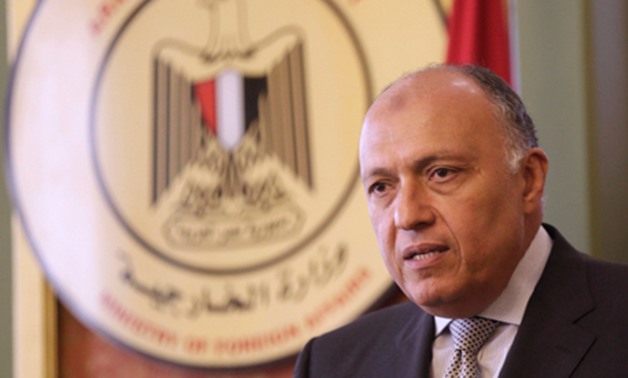
Egypt's Foreign Minister Sameh Shoukry - Reuters
CAIRO – 16 May 2018: The nine-party meeting held on Tuesday over the Ethiopian Grand Renaissance Dam (GERD) in Addis Ababa, Ethiopia has ended successfully, Egypt’s foreign ministry spokesperson, Ahmed Abu Zeid, said via Twitter.
The ministers of irrigation and water resources as well as the chiefs of intelligence services of Sudan, Egypt and Ethiopia sit yesterday to follow up the results of the previous round of the nine-party meeting that took place on April 4 in Khartoum.
Egypt aimed through this meeting to end the disagreement over the technical studies related to the dam’s impact on the downstream countries of Egypt and Sudan and resume the studies agreed upon in the Declaration of Principles in March 2015.
The leaders of Egypt, Sudan and Ethiopia have signed the Declaration of Principles in a step to put an end to the dispute over Nile water sharing arrangements among Nile Basin countries.
The 10-principles declaration was the foundation that further agreements should be based on and was one of the first steps on the path of “understanding and rapprochement between Egypt, Sudan and Ethiopia.
Egyptian diplomatic sources pointed out that the current dispute was caused by the Ethiopian and Sudanese sides' misinterpretation of the Declaration of Principles. They said that Ethiopia is trying to twist the principles in a way that serves its interests without any obligations, while Egypt aims to limit the harmful effects that may be caused by the dam.
Before the nine-party meeting, the Ethiopian Prime minister Abiy Ahmed met with the Egyptian delegation and affirmed his full commitment to boosting and developing relations with Egypt in the interest of both countries.
The Egyptian foreign ministry said that the Egyptian delegation formally invited Ahmed to visit Cairo as soon as possible.
Egypt depends entirely on Nile water for drinking and irrigation purposes, reiterating consistently its "historical right" to the river guaranteed in the 1929 and 1959 Nile agreements, which granted the country 87 percent of Nile water and the right to veto or approve irrigation projects in the upstream countries.
Egypt’s average water per-capita is expected to drop from 663 cubic meters per year to 582 cubic meters by 2025, according to the Central Agency for Public Mobilization and Statistics (CAPMAS). Addis Ababa, however, claimed that the dam is necessary for Ethiopia’s development and will not harm downstream countries.
In 2011, Ethiopia started the construction of the 6,000-megawatt Renaissance Dam over the Blue Nile River, one of the major sources of water that forms the Nile River downstream. Concerns have risen in Cairo and Khartoum over the negative impact the Ethiopian dam will have on their historic Nile water share, amounting to 55.5 billion cubic meters in Egypt only, in accordance with the historic 1959 agreement with Sudan.
Comments
Leave a Comment